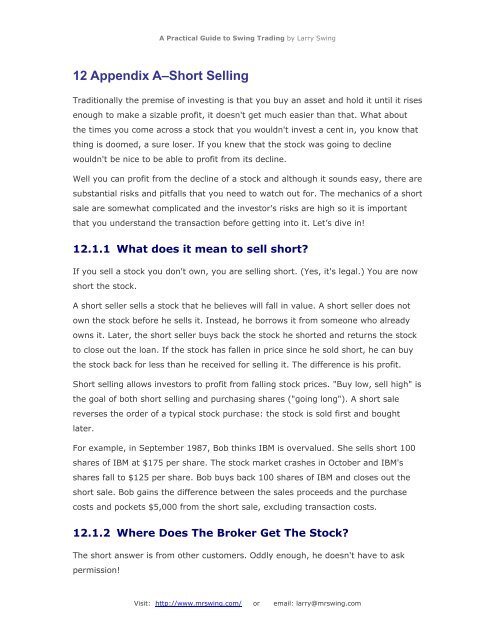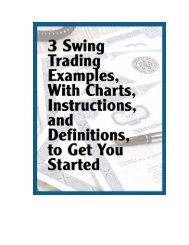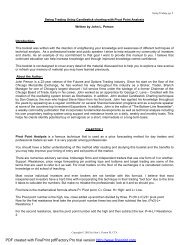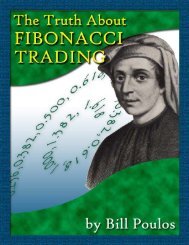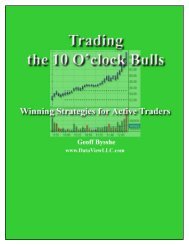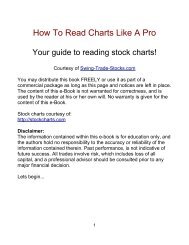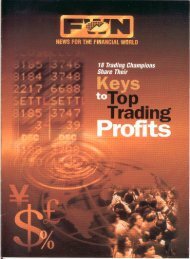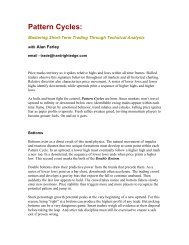To all those who did not dedicate - The Swing Trading Guide
To all those who did not dedicate - The Swing Trading Guide
To all those who did not dedicate - The Swing Trading Guide
You also want an ePaper? Increase the reach of your titles
YUMPU automatically turns print PDFs into web optimized ePapers that Google loves.
A Practical <strong>Guide</strong> to <strong>Swing</strong> <strong>Trading</strong> by Larry <strong>Swing</strong><br />
12 Appendix A–Short Selling<br />
Tradition<strong>all</strong>y the premise of investing is that you buy an asset and hold it until it rises<br />
enough to make a sizable profit, it doesn't get much easier than that. What about<br />
the times you come across a stock that you wouldn't invest a cent in, you know that<br />
thing is doomed, a sure loser. If you knew that the stock was going to decline<br />
wouldn't be nice to be able to profit from its decline.<br />
Well you can profit from the decline of a stock and although it sounds easy, there are<br />
substantial risks and pitf<strong>all</strong>s that you need to watch out for. <strong>The</strong> mechanics of a short<br />
sale are somewhat complicated and the investor's risks are high so it is important<br />
that you understand the transaction before getting into it. Let’s dive in!<br />
12.1.1 What does it mean to sell short?<br />
If you sell a stock you don't own, you are selling short. (Yes, it's legal.) You are now<br />
short the stock.<br />
A short seller sells a stock that he believes will f<strong>all</strong> in value. A short seller does <strong>not</strong><br />
own the stock before he sells it. Instead, he borrows it from someone <strong>who</strong> already<br />
owns it. Later, the short seller buys back the stock he shorted and returns the stock<br />
to close out the loan. If the stock has f<strong>all</strong>en in price since he sold short, he can buy<br />
the stock back for less than he received for selling it. <strong>The</strong> difference is his profit.<br />
Short selling <strong>all</strong>ows investors to profit from f<strong>all</strong>ing stock prices. "Buy low, sell high" is<br />
the goal of both short selling and purchasing shares ("going long"). A short sale<br />
reverses the order of a typical stock purchase: the stock is sold first and bought<br />
later.<br />
For example, in September 1987, Bob thinks IBM is overvalued. She sells short 100<br />
shares of IBM at $175 per share. <strong>The</strong> stock market crashes in October and IBM's<br />
shares f<strong>all</strong> to $125 per share. Bob buys back 100 shares of IBM and closes out the<br />
short sale. Bob gains the difference between the sales proceeds and the purchase<br />
costs and pockets $5,000 from the short sale, excluding transaction costs.<br />
12.1.2 Where Does <strong>The</strong> Broker Get <strong>The</strong> Stock?<br />
<strong>The</strong> short answer is from other customers. Oddly enough, he doesn't have to ask<br />
permission!<br />
Visit: http://www.mrswing.com/ or email: larry@mrswing.com


